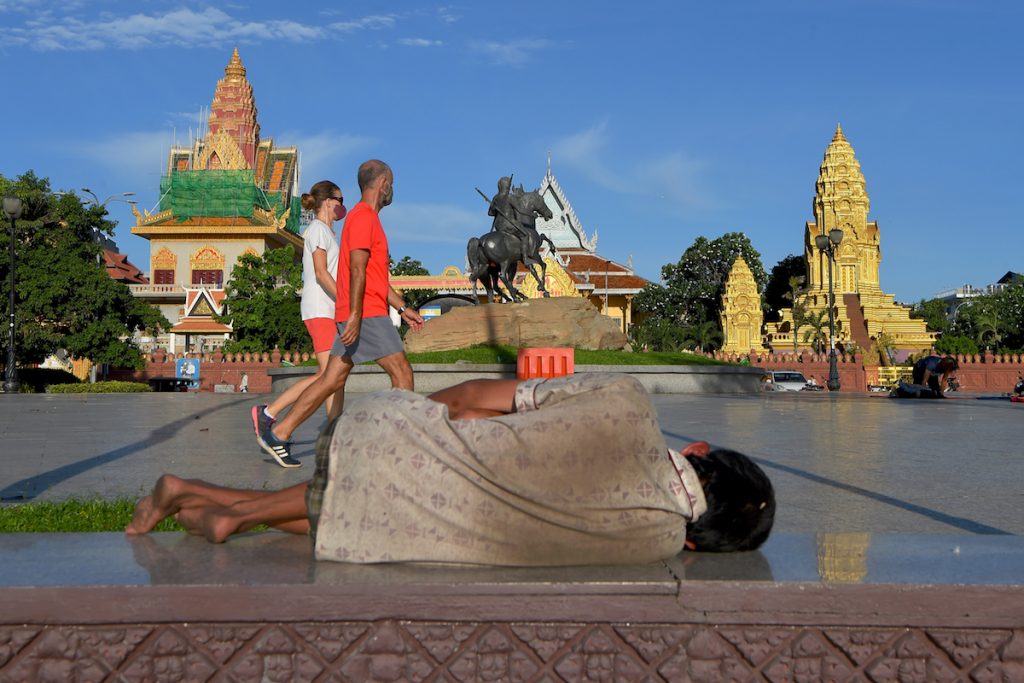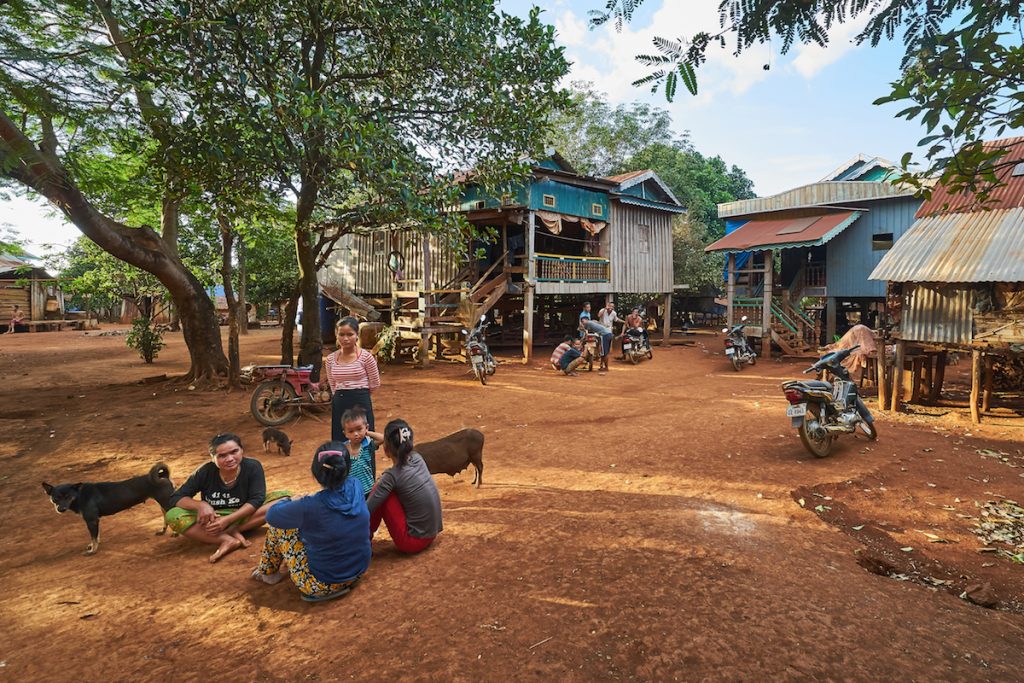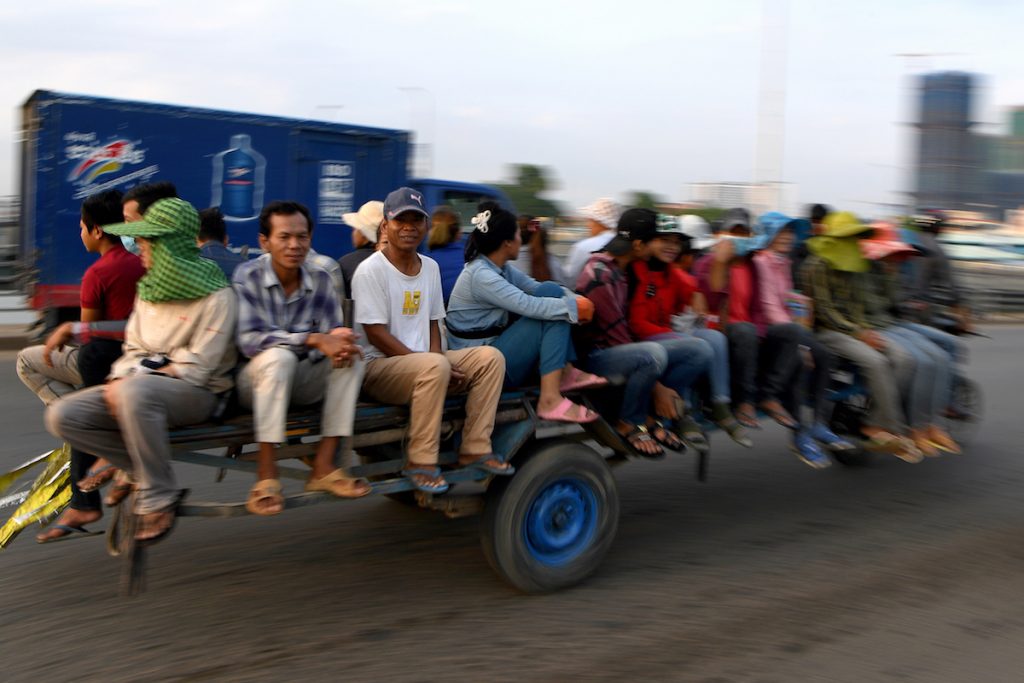Bo Yom sits to take a break at a construction site in downtown Phnom Penh. On a normal day Bo would be going around in his tuk tuk, driving locals to the market and tourists to see the highlights of Cambodia’s capital city.
But today he’s spending time at a construction site for a condominium, where a friend offered him several days of work.
“There’s not a lot of work for tuk-tuk drivers at the moment, so I’m often going out to see if I can find a job elsewhere,” he said.
Today Bo’s lucky, earning a bit of money but with Cambodia grappling with a growing economic crisis uncertainty will return.
Bo’s country faces a range of economic challenges: Climate change, a rapid decline of fish stocks in main water ways and the upcoming loss of trade preferences with the European Union that will hurt Cambodia’s crucial garment industry. Add to that is COVID-19, which has devastated tourism and foreign investments while also stopping hundreds of thousands of Cambodians from finding jobs overseas.
A recent World Bank report said that the “global epidemiological and economic crisis unleashed by COVID-19 poses the greatest threat to Cambodia’s development in its 30 years of modern history.” The financial institution expects Cambodia’s economy will shrink 1 to 2.9 percent this year.
The Asian Development Bank has an even gloomier forecast, expecting Cambodia’s GDP to shrink with 5.5 percent. It’s a huge fall after 2019, when the GPD grew with 7.1 percent.

Hardest hit
Tourism is the hardest hit industry. Last year Cambodia welcomed 6.6 million foreign visitors but now that borders are closed, hundreds of hotels, restaurants, bars and spas have shut their doors and tens of thousands of tourism workers have lost their jobs.
The global economic advisory firm Oxford Economics estimates that the travel and tourism industry supports over 25 percent of Cambodia’s economy.
“This crisis is completely killing tourism development. It’s will be hard to recover from it and it will take a lot of time,” Sinan Thourn, chairperson of the Cambodia chapter of the Pacific Asia Travel Association, told LiCAS.news.
Cambodia’s construction sector, another major employer and one of the main engines of the economy, is also taking a big hit. The sector largely depends on foreign direct investments but with the pandemic funds are drying up, as is demand for new houses, offices and hotels. Many construction projects have been cancelled or delayed.
Kim Heang, CEO of Khmer Real Estate, said that construction projects often rely on the pre-sale of condominiums or offices but now buyers are cancelling or are unable to pay their bills, leaving investors emptyhanded.
“It’s risky and because of that more than half of the projects that started in 2018 and 2019 can’t be finished. Those who don’t have enough cashflow, will delay or stop the construction,” Kim said.
Despite the challenges, Heang, still has room for optimism. With a young population, Heang said it’s possible that Cambodia can make a quick recovery.
“When a man is 70 years old and he gets sick, he needs time to recover but when a man is only 20 years old, he recovers very fast,” Heang said.

The ‘collapse of growth’
On Aug. 12 the European Union (EU) will partially withdraw Cambodia from its lucrative trade scheme Everything But Arms (EBA). From this date Cambodia will have to pay tariffs for a large selection of garment and footwear products, travel goods and sugar exported to the EU.
Brussels said the drastic measure is necessary because of Cambodia’s violation of human rights, and a lack of respect for democracy. Labor organizations, trade unions and employers’ associations warn that the partial loss of the EBA will make Cambodia less competitive and will result in a large loss of jobs.
Those Cambodians who depend on traditional jobs in agriculture or fishing won’t have it easy either. Fish stocks in the main water ways Tonlé Sap and Mekong River have declined massively over the past few years. Meanwhile unpredictable weather, and low prices has put farmers at risk.
In the past decade or so millions of Cambodians managed to escape poverty but that us now under threat. Some 4.5 million people in the country remain near-poor, making them vulnerable to economic and other external shocks, according the World Bank. The financial institution also noted that “the collapse of growth” puts at least 1.76 million jobs at risk.
In a bid to help the impoverished, Cambodia recently introduced a poor identity card scheme which allows access to government aid. Authorities have said they are making about $25 million available per month spread out for over 560,000 families. The funds, however, may not be enough to help everyone and getting the poor ID card can be a struggle for homeless people and beggars, according to the Khmer Times.
The government has also offered tax relief for businesses involved in tourism and manufacturing, and a wage subsidy for laid-off workers in those sectors.

However when it comes to poverty no-one dares to look at the reality, said Sophal Ear, an associate professor at the Occidental College in Los Angeles and an expert in Cambodian politics.
“Don’t expect any firm numbers. It will only prove the fragility of development in Cambodia. The reality is that even the poverty reduction achieved over the past two decades was hardly consolidated,” Sophal said.
“The elasticity of the poverty line mattered insofar as many people just above the poverty line could fall into poverty with just a minor shock. Now you have the mother of all shocks,” he said.
Asked what can be done to ease the current pain, Sophal said the government could implement better policies to deal with such unprecedented times. “It can behave like a normal government that cares about its people, does what’s right, by spending some coin, reform, and bring back democracy, human rights and freedom to people,” he said.
Yet no matter what the government does any recovery from the COVID-19 induced crisis won’t be easy. Cambodia’s underdeveloped open economy very much depends on external factors over which it has limited influence.
In its report the World Bank warned that the “shape and pace of recovery remains highly uncertain and largely depends on the course of the (corona)virus.”






